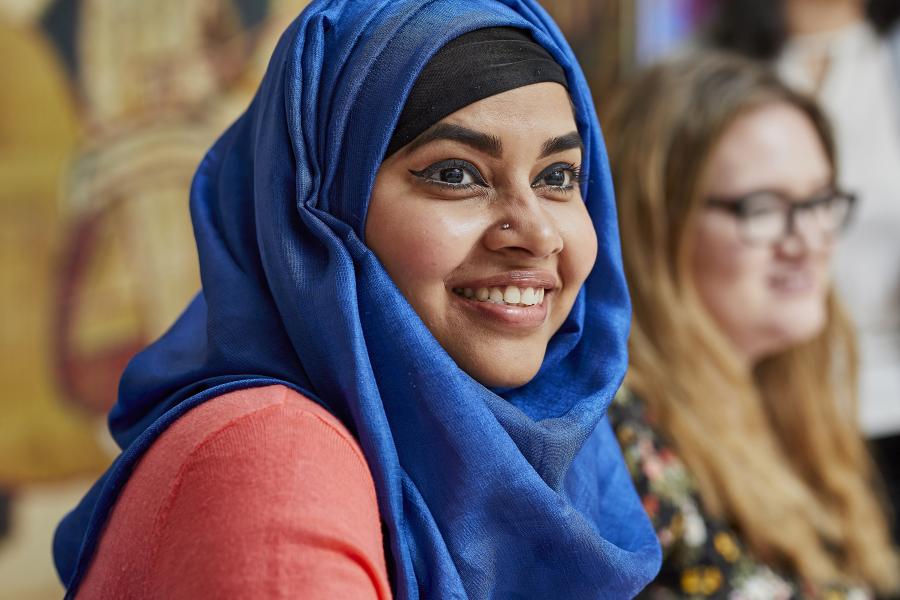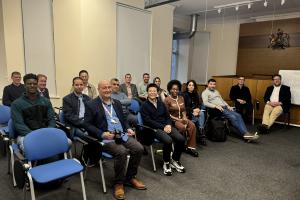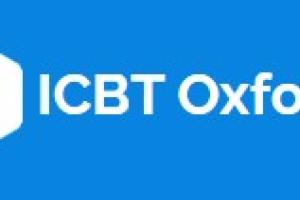Postgraduate Research Programmes
Our PGR courses are designed for candidates with degrees or related backgrounds, who wish to develop their expertise and further their professional and academic careers. Our research degrees of MRes, MPhil and PhD offer opportunities to make a significant and original contribution to knowledge in the chosen subject area.
A PhD degree is usually 3 years full-time, or 5-6 years part-time. Candidates are expected to present the results of their research in a 100,000-word thesis which represents a significant original contribution to knowledge in the subject area studied, and to undergo a viva voce examination.
An MPhil (Master of Philosophy) degree is usually 2 years full-time, or 3 years part-time. Candidates must successfully complete an approved programme of supervised research, and present their results in a thesis of up to 60,000 words.
We welcome interdisciplinary studies that focus on one of the themes stemming from the work of our two Research Centres at The Albert Gubay Business School, Institute of European Finance (IEF) and Rhanbarth Research Centre for Sustainable Regions and Economies. IEF focuses its research studies around four key themes: ‘Accounting and governance’; ‘Banking’; ‘Credit risk’; and ‘Financial Innovation and Data Analytics’. Rhanbarth focuses on different research themes: ‘Understanding behaviour’; ‘Tourism, destinations, and place engagement’; ‘Organisational behaviour’; and ‘Tax and welfare’
Our PGR programmes at The Albert Gubay Business School has been described by external experts as ’second to none in the UK’. Our role of PhD throughput is amongst the highest in the UK and we have ESRC recognition for our research training (MSc to PhD or PGCert in Research Methodology in PhD Year 1) in Management and Business as well as Economics.
PhD projects
Our research centres are interested in supervising PhDs in the topics listed below.
- Consumer financial wellbeing and sustainable financial services through FinTech solutions
This project investigates the nexus between sustainable consumer behaviour and technology-enabled financial services. The theme of sustainability continues to permeate all areas of business, marketing and consumption, while technology is becoming ever more embedded in the delivery of financial services. For example, sustainable consumer behaviour includes areas such as financial wellbeing. Nevertheless, these themes are progressing at a different pace around the world, and considerable variation exists across financial services segments. This project will investigate potential positive outcomes arising from designing sustainability into new financial products and services, and will consider how these outcomes vary across developed and emerging economies. The segments of credit and investment will be a particular focus. Additionally, this project will look at sustainable consumer financial wellbeing through the use of FinTech. - Self-regulation, emotion and consumer wisdom of Buy Now Pay Later (BNPL) users
The number of Buy Now Pay Later (BNPL) users has increased as a result of the cost-of-living crisis and the level of UK personal debt is at an all-time high. This project seeks to examine the relationships between self-regulation, emotion and consumer wisdom when using BNPL loans to shop online. The study will also explore a potential link between self-regulation failure related to BNPL and the fear of missing out. Differences in consumer spending using BNPL (i.e. essential purchases vs non-essentials) and the potential benefits of BNPL will also be explored with the aim of promoting positive consumer financial well-being. - Exploring the growth of vaping and the marketing of e-cigarette brands
Vaping as a behaviour is commonplace and increasingly normalised but there has been a rise in vaping amongst young people over the past five years. Research suggests that young people are experimenting with vapes, and there is an uptake in the use of disposable vapes with Elf Bar and Geek Bar emerging as popular brands. This project will explore young people’s attitudes and perceived identities in relation to their vaping behaviours. The research will also examine the communication techniques of e-cigarette brands (e.g., branding, packaging, in-store communications, social media marketing) and how they are processed by both vapers and non-vapers. - Psychological ownership and perceived control of a City by its consumers: the case of Bangor
This project will investigate the perceived control, psychological ownership and place attachment felt by Bangor’s students, residents and visitors. The city’s current versus desired place brand will be examined and the needs of stakeholders will be explored with the aim of rejuvenating the city’s image. The High Street in Bangor has been in decline for years and the city was recently rejected in its application for the Levelling up fund. Community engagement and a bottom-up approach to improving the City’s brand is required and will be critical in the future attractiveness of Bangor as a place to study.
- ESG Performance and Syndicated loan market
The syndicated lending market has evolved into a pivotal segment within the global financial landscape. This project intends to dive deep into the burgeoning dynamics of this market, specifically examining its interactions with Environmental, Social, and Governance (ESG) factors. The appointed candidate will venture into the exploration of the impact of ESG factors and climate change on the bank lending behaviours. market's dynamics, risk attributes, and economic ramifications, uniquely emphasizing the market's responses to climate change and ESG implications. This study aims to augment both industry and academic comprehension, integrating the syndicated lending traditional finance with sustainable and socially responsible investing goals, thereby fostering a resilient financial market that aligns with ESG principles. - The impact of the Paris Agreement on cross-border mergers and acquisitions: An analysis of green vs brown lending
In recent years, climate change has attracted great attention from policy makers and academic researchers. The new climate policies could induce uncertainty in the form of climate transitional risk to firms, that would require them to adopt and change their policies. At the first stage, this PhD project aims to examine the impact of the Paris Agreement (COP21) on the firm’s cross-border mergers and acquisitions behaviour. Moreover, it aims to examine how these changes in firms' behaviour spill over into the realm of bank lending behaviour and the broader implications for global financial stability. - Environmental innovations and financial instability
In a global environment, combating climate change necessitates cooperation between all economic sectors. Whether directly or indirectly it is indisputable that practically every industry contributes significantly to both economic growth and environmental effects. With the financial sector’s central role as intermediary in the functioning of the economy, financial instability could potentially lead to the collapse of banks and corporations. Then, financial stability or instability could be a key metric for investment of R&D (innovation) by firms. This project explores the important link between financial stability and R&D innovation. Where stable financial systems may enhance R&D innovation and the role of R&D investment in the banking lending. - Digital transformation, environmental sustainability and supply chain in the Banks and Industrial firms.
Climate finance' is a multifaceted concept. It generally refers to finance for activities aiming to mitigate or adapt to the impacts of climate change. Decisions and technology transformation related to green policies affects the future of the companies and their profitability. The successful applicant will delve into various aspects of digital transformation, gaining a comprehensive understanding of the development and the implementation of technology, impact on economies, and other related topics, making significant contributions to the financial industry and academia.
- Trading on the Political Stage: Analysing the Influence of Political Events and Sentiment Shifts on Retail Investor Behaviour
In recent years many new retail investors have entered financial markets in droves thanks to the rise of “app-based” trading platforms and accelerated by the covid-19 pandemic. Researchers and policymakers and now examining the how these new retail investors, which are known to be more prone to bias, behave. We are interested in supervising a research proposal that aims to investigate the influence of political events and sentiment shifts on the trading behaviour of retail investors.
The capitalisation of fiscal policy into land values
The fact that the value of infrastructure and public services are capitalised into land values is well established*. The aim of this PhD project is to ascertain whether, and to quantify the extent to which, welfare and tax policies more broadly get capitalised into land values.
The project will consider the effect of (1) minimum wage legislation, (2) welfare payments (including tax credits) and (3) income tax thresholds on the rental values of propertie inhabited by the targeted groups. Implications for the implementation of tax and welfare policies will be drawn in order to inform future policy debates.
Understanding the Welsh Tax Base – Demography and Migration
This project seeks to analyse the linkages between the Welsh tax base and the key fundamentals of the Welsh economy, polity, and society which drive migration and demography.
One key aspect will be to consider the international evidence on the impact of tax differentials on migration, and use this to model the potential impact of tax differentials between Wales and England on migration and tax revenues in the context of the current devolution settlement and potential future tax powers. Another key aspect will be to gather evidence on the lifecycle demographics of the Welsh population and its implications for tax revenues (and government spending) in Wales.
How have published Tax Strategies evolved since the UK tax strategy requirement was first introduced?
In 2015, HMRC introduced a requirement for certain large businesses (approximately 2,000 organisations) to publish a tax strategy document, with financial penalties for non-compliance. Proposed research would consider the volume and nature of disclosures in published tax strategy reports, studying how they have developed over time, and the development of accepted practice for these reports. The large accounting firms offer specific guidance on these strategy reports, and their role would also be considered in reviewing how these reports contribute to the company’s tax reputation, building on previous research on the use of CSR reports for impression management.
Stakeholder perspectives on dual-class stock structures
An increasing number of firms are adopting dual-class share structures, whereby a class of stock with superior control rights is held by company insiders/founders (Aggarwal, Eldar, Hochberg & Litov, 2022). Dual-class structures are known to associate with risk of increased agency problems relating to managerial extraction of private benefits, at the expense of outside shareholders (Masulis, Wang & Xie, 2009). Yet, still little is understood about their impact on other stakeholders (e.g., employees, suppliers, customers, or society at large) or Corporate Social Responsibility (CSR) outcomes. We particularly welcome proposals relating their use to pressing global challenges (e.g., climate change).
- The War in Ukraine and firm performance
This PhD project will investigate the strategic decision-making of firms in the context of the Ukraine War. The primary aim of this project is to examine various outcomes of companies that are exposed to this geographical area during the conflict. The project will explore the decisions made by these companies, and how these decisions have impacted them. This research will contribute to the existing literature on the implications of geopolitical conflicts for multinational corporations and provide valuable insights for companies facing similar dilemmas in the future. - The impact of ESG shocks on Credit Ratings: The role of Information Uncertainty and the ESG-Credit Rating channel
In recent years, policy makers and the public are starting to reveal greater awareness of Environmental, Social and Governance (ESG) issues such as climate change and corporate responsibility. Academic researchers are investigating whether the nature of a business and how it reacts to ESG issues can determine how it will perform in the future and its ability to pay its debts (credit risk). This PhD project aims to investigate the strength and nature of this ESG - Credit Rating channel and how shocks can be transmitted through it from the ESG realm to corporate credit.
- Investigating Future Prosperity - How Management Skills can Boost Growth in the Regions and Beyond
This project is an extension of the supervisory team’s contribution to the CMI's latest policy paper which focused on the West Midlands Future Prosperity. The new project will address the important topic of boosting growth through management skills by comparing and contrasting three regions including Wales, the North East and the West Midlands. There are wider implications by addressing the UN’s Sustainable Development Goals. Qualitative methods will be used to reveal key themes and build towards new theory, especially related to place leadership. There is a practice dimension which delivers impact by helping regional organisations such as SMEs to grow. - Sustainable Heritage and Social Innovation as Enablers of UN’s Sustainable Development Goals
In 2015, UNESCO published a policy document for the integration of a sustainable development perspective into the processes of the World Heritage Convention. In other words, for the first time, the role of heritage and creativity is seen as an enabler of sustainable development across the Sustainable Development Goals. In order to develop and test new approaches, this project will compare and contrast two live projects which are in the process of bringing heritage sites into re-use with an emphasis on community involvement. Action research will surface concepts and practices about sustainable heritage. There will be a wider contribution to social innovation and emergent theory in this field.
- Smart technologies and data analytics for the sustainable development of places to live and visit
The increasing use of smart technologies and Internet of Things offers the tourism sector an abundance of big data, which can be used to generate new insights to foster the sustainable development of places to live and visit. This project will explore how data from smart technologies can be used to support the development of innovative solutions to more efficiently allocate resources, enhance visitor experiences and promote of sustainable economic growth. Real-world data and modern data analytic techniques will be used to analyse and predict consumer behaviour to determine how different messages and agents influence visitor experiences and sustainable behaviours. - Tourism in fragile destinations: hosts’ and tourists’ perceptions
The project explores tourism development in fragile destinations and the overall well-being of hosting communities. "Fragile destinations" refer to places vulnerable to negative tourism impacts, going beyond environmental degradation to focus on cultural identity, lifestyle decline (congestion, service strain, local housing scarcity, price inflation), and economic dependence. Some fragile destinations have protection via National/Natural Parks or UNESCO listing; others, vulnerable, lack recognized status. Applied to North Wales, the study examines safeguarded and unsafeguarded fragile destinations, highlighting benefits and challenges in secured status comparison. This comparison identifies positive outcomes and challenges tied to formal recognition of protected areas. - Climate change and destination branding: an evolving perpetual and place orientated strategy
The project aims to examine tourism destinations adaptation to climate change. While individual adaptation is dependent on personal knowledge and values, due to the stakeholders involved, for a ‘destination’ to adapt, it faces a multifaceted process. As such it is important to examine whether this interplay is reflected in public authorities’ and/or destination management organisations (DMOs) approach to destination branding. Therefore, this project will compare attitudes and perceptions towards climate change and the (potential) adaptation of the destination(s) to determine the stakeholder perceptions of the vulnerability and/or resilience of the place’s physical and sociocultural determinants to climate change and the implications on destination branding and image.
The Albert Gubay Business School is a leading teaching and research focused business school. You will be taught by academics who are experts in their areas and whose research contributes to the development of policy, the advancement of their disciplines, and even the better understanding of business itself.
Supervision and other support
All PhD/MPhil students require supervision from at least one academic member of staff at the University, and if you are considering a PhD/MPhil, you will already have a good idea of the specific area or theme that you want to research. In order to ascertain that we hold sufficient expertise in your chosen topic to provide supervision, you should first look at our staff pages. This will provide you with a breakdown of each staff member’s area of academic focus.
Each postgraduate researcher is allocated a named Principal Supervisor (also referred to as a First Supervisor), and one or more Co-Supervisors (referred to as a Second Supervisor and Third Supervisor) who may share supervision responsibilities as agreed with the principal supervisor.
Supervisors must be:
- A full-time member of academic staff.
- A part-time member of academic staff with academic, clinical or professional experience.
- A suitably qualified member of the staff of another university or research institution.
Successful postgraduate researchers are self-reliant, well-organised and able to call upon a variety of inner resources. It is essential that each postgraduate researcher develops a good relationship with their Supervisors. This relationship not only involves initial guidance and later advice, but can also enable a postgraduate researcher to gain access to scarce research resources through funding provided to staff in national and international research grant programmes. Where appropriate, Supervisors will introduce their postgraduate researchers to technical, administrative and archival staff who are able to provide help with a project; and it should be appreciated that in the environment of university research, the quality of this assistance is inevitably enriched by having a good working relationship with Supervisors.
Other support, in addition to that provided by your Supervisors, is available throughout your studies at BBS. These include training and workshops organised by the University’s Doctoral School, Study Skills Centre, Library Services, specific training events held by BBS and regular research presentation sessions held within BBS’ research and postgraduate research seminar series.
Apply for Postgraduate Research Study
You can apply online for all postgraduate research programmes at The Albert Gubay Business School. Before applying we recommend you speak to the academic staff you wish to be supervised by to discuss your interest area and research proposal. You can find a list of staff interest areas within their profiles.
Home/EU students: apply online through our Online Application Portal yourself with the help of our Guidance Notes on online application for Home/EU students. We recommend that you speak to the academic staff you wish to be supervised by to discuss your interest area and research proposal before applying. You can find a list of staff interest areas within their profiles.
International students: can apply through our Online Application Portal. Refer to the Guidance Notes for help filling the form. We recommend that you speak to the academic staff you wish to be supervised by to discuss your interest area and research proposal before applying. You can find a list of staff interest areas within their profiles.
More information about how to apply as an international student can be found here.
International students can seek further help by contacting our International Education Office
- Email address: international@bangor.ac.uk
- Address: International Education Centre, Bangor University, Gwynedd, Wales UK, LL57 2DG
- Telephone number: +44 (0) 1248 382028
Agents: if you are an agent applying on behalf of the student, then you can Apply here. For further guidance click here. We recommend that students speak to the academic staff they wish to be supervised by to discuss their interest area and research proposal before applying. A list of our staff interest areas can be found within their profiles.
As part of the application process for a research degree, you will be asked to submit a research proposal. This should be relevant to the research interests and expertise of staff members and our Research Centres, as these are the areas in which we can offer supervision. We therefore recommend that applicants refer to our Business School staff pages and Research Centre pages before preparing a research proposal.
The research proposal should be between 1,500 and 2,500 words, and should outline the following:
- Provisional title
- Central question or hypothesis for investigation
- Key aims of the research
- Literature review
- Description of your topic
- Methodology – how you will answer the research question
- Bibliography
- Timetable
Click here for guidance about how to write a good research proposal.
In addition to the research proposal, you should also submit the following as part of your application package:
- Bachelor degree certificate and transcript(s)
- Academic reference/support letter
- Passport
- Detailed CV (highlighting your Relevant work experience, Research project experience, Publications, and Academic achievements)
- Once you have found a member of staff whose research interests broadly accord with your own, you should state their names as part of your application so that your application may be considered by them.
- English language test certificate (if undertaken)
- Confirmation of funding/sponsorship (if applicable)
- Masters degree certificate and transcript(s) (required for PhD applications)
- Confirmation letter of external funding (if applicable)
You can apply at any time of the year. It is possible to start a PhD degree at any point in the year at most academic Schools, subject to agreement with the supervisor. We advise that you submit your application in enough time to: organise funding; undertake an English course (if needed); obtain documents such as transcripts and references required for meeting the conditions of the offer; apply for a visa (if required); and make accommodation arrangements (if required).
Scholarship opportunities
As with all of our courses, you can apply to fund yourself through a PhD/MPhil at The Albert Gubay Business School, or you may already have sourced external funding (e.g., from your employer or government), and we warmly welcome all expressions of interest in so doing.
Funded PhD studentship opportunities arise frequently throughout the year, and are advertised as specific opportunities for which you must formally apply. Current PhD studentship opportunities available at The Albert Gubay Business School will be listed below and updated regularly. If you have any queries, please get in contact with The Albert Gubay Business School Director of PGR, Dr Charlotte Rimmer.
Bangor University are delighted to offer fully funded Wales Graduate School for the Social Sciences (WGSSS) (ESRC DTP) studentships starting in October 2025 in the following pathway subject areas.
- Bilingualism/Linguistics
- Psychology
- Sport and Exercise Science
- Criminology and Law
- Sociology/Science and Technology Studies
- Data Science, Health and Wellbeing
- Education
- Social Work, Social Care, and Social Policy
- Economics
- Management and Business
- Environmental Planning
Entry Criteria:
To receive WGSSS studentship funding, you must have qualifications or experience equivalent to an UK honours degree at a first or upper second-class level, or a masters. Students with non-traditional academic backgrounds are also welcome to apply.
Duration of study:
The duration of study varies from 3.5 to 4.5 years full time (or part time equivalent).
The duration study is dependent on prior research experience and training needs of the student which will be assessed by completing a Development Needs Analysis. We welcome applications for both full and part-time study.
Research in practice placement:
All WGSSS funded students are required to complete a funded Research in Practice placement of 3-months in total (or part-time equivalent). All students will have the opportunity to complete a placement in academia, policy, business or civil society organisations.
International Eligibility:
WGSSS studentships are available to home and international students. Up to 30% of our cohort can comprise international students. International students will not be charged the fee difference between the UK and international rate. Applicants should satisfy the UKRI eligibility requirements.
Equality, Diversity and Inclusion:
WGSSS is committed to supporting and promoting equality and diversity and creating an inclusive environment for all. We welcome applications from all members of the global community irrespective of age, disability, sex, gender identity, gender reassignment, marital or civil partnership status, pregnancy or maternity, race, religion or belief and sexual orientation.
Assessment:
Short-listed applicants will be invited to interview. As part of the interview process, applicants will be asked to give a short presentation and answer a series of panel questions
How to apply:
Applications should be received no later than 11/12/24 including all required documents. Due to the volume of applications received, incomplete applications will not be considered.
All applications should be submitted using the following links (please use the correct email address for the pathway being submitted to:
- Bilingualism/Linguistics – bilingwgsss@bangor.ac.uk
- Psychology – psychwgsss@bangor.ac.uk
- Sport and Exercise Science – spexwgsss@bangor.ac.uk
- Criminology and Law – crimwgsss@bangor.ac.uk
- Sociology/Science and Technology Studies – socwgsss@bangor.ac.uk
- Data Science, Health and Wellbeing -dshwbwgsss@bangor.ac.uk
- Education eduwgsss@bangor.ac.uk
- Social Work, Social Care, and Social Policy – socialworkwgsss@bangor.ac.uk
- Economics econwgsss@bangor.ac.uk
- Management and Business businesswgsss@bangor.ac.uk
- Environmental Planning envirowgsss@bangor.ac.uk
Please include the following documents with your application:
- Academic CV (two pages maximum)
- 2 academic or professional references (candidates must approach referees themselves and include references with their application. The reference must detail the applicant’s research strengths).
- Degree certificates and Transcripts (including translations if applicable)
- If relevant, proof of English Language Competency (see institutional requirements for entry)
Funding:
The studentship funded by the ESRC covers tuition fees, an annual tax-free living stipend of in line with UKRI minimum rates (currently £19,237) and includes access to a Research Training Support Grant.
If you have a disability, you may be entitled to a Disabled Students’ Allowance (DSA) on top of your studentship.
The University also regularly offers scholarships, studentships and bursaries.







